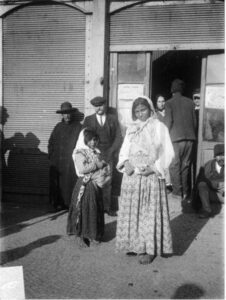“Considering the behaviours of the Gypsies that “commit theft, deceit and many other offences and outrages”, the king orders that “no one in this kingdom… uses the costumes, the language or the contraptions of the Gypsies… that they don’t live together, or occupy more than two houses per street, or walk together on the roads”, but use the way of life of the people of the land.”

The 8th of April was officially declared as the International Roma Day in 1971, having been accepted by the majority of associations of Romani communities, with a view to promote the Romani culture.
The National Archive Torre do Tombo presents a law of 1708, of King John V, on the Romani people.
This law, like others issued in previous and posterior kingdoms, is a significant document for the knowledge of the history of the condition of the Romani minority in our country that, since its arrival to Portugal in the 15th century coming from Spain, was the object of discriminatory laws.
Besides the rejection of nomadism and other habits and traditions – like language, costumes and fortune-telling – these laws established penalties like working in the galleys and being exiled to Portuguese colonies, like Brazil.
It would take four centuries of living in the Portuguese territory for the Romani people to be granted the Portuguese citizenship, in 1822, by the Constitution of the Liberal Monarchy.
The Romani people, widely known for their negative visibility, are however still unknown for their history, culture and traditions.
The Roma were victims of the Holocaust (25 to 50 percent of the population) but were only tardily recognised as such: it was only in 2012 that the first monument in memory of the Romani victims of the Holocaust was inaugurated in Berlin, Germany.
Throughout Europe the hostility against the Romani people has been increasing, which today represent 12 to 10 million people in the European Union. In Portugal, they represent only 0.3 percent of the population, about 35 thousand people.
Zeljko Jovanovic, the director of the Open Society Roma Initiatives Office, states that “The situation of the Roma reflects the deep European values and liberal democracy crisis” (…) “Many politicians all over Europe have learned that they can manipulate society against the Roma to gain votes.”
The European Romani people are still particularly vulnerable to poverty and exclusion, being considered the poorest ethnic group, with worse living conditions, undereducated and the main target of racism and discrimination in modern societies.
In response to this problem the European Union implemented, from 2011, an EU Framework for National Roma Integration Strategies.
In 2013, for the first time, a strategy specifically directed at the Romani people in Portugal was approved: National Roma Integration Strategy.
The evaluation reported by the European Commission indicates that the goal is far from being achieved: the access to education has improved (the attendance of early childhood education has increased and early school-leaving was reduced), but there is little advance in health, the housing situation is still critical. In the employment area there was no relevant improvement, there is even more youth that neither study nor work and, in some countries, the hostility has increased.
Maria Trindade Serralheiro, Senior Technician / Information, Statistics and Quality Systems, General Directorate of Books, Archives and Libraries, Portugal
Ana Isabel Fernandes (trad.), Senior Technician / Communication Office, Torre do Tombo National Archive, General Directorate of Books, Archives and Libraries, Portugal
